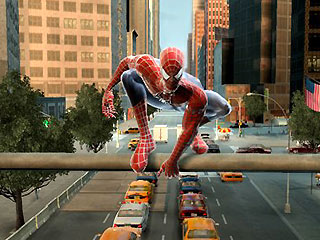Editor’s note: Like Steve, I’ve also worked on the development side of the industry, and I’ve seen cases where license deals quite literally shoved titles out the door long before they were ready just because the contract stipulated a specific release date. That’s not the only reason licensed games tend to suck, but it’s one of them. Steve goes into detail on some of the other reasons, but he also explores some solutions with the help of his friend — a movie buff who’s also a casual gamer. -Fitch
 As a gamer, I’ve been around long enough to know that the vast majority of movie-licensed games are garbage, and I generally assume they’re not worth playing unless I hear otherwise. My views aren’t uncommon among the gaming populace, which raises this question: Who’s buying these games?
As a gamer, I’ve been around long enough to know that the vast majority of movie-licensed games are garbage, and I generally assume they’re not worth playing unless I hear otherwise. My views aren’t uncommon among the gaming populace, which raises this question: Who’s buying these games?
Obviously, plenty of consumers do — otherwise, the movie-licensed category would’ve died long ago. But in stark contrast to critical reception, many of these games sell quite well.
It’s an easy enough question to answer, though: Non-gamers buy these games. It’s the folks who see Spider-Man 3 in theaters, enjoy it, hear there’s a Spider-Man 3 game, and think, “Oh, cool — more Spider-Man 3! I do have that PlayStation 3 thingie that I use to watch Blu-rays and play Guitar Hero.”
So, how do we change this attitude?
One of my good friends is a bit of a movie buff. But even at best, he’s what you might refer to as a “casual” gamer. As a kid, he owned an NES, and in college he had a PlayStation 2, but he’s never been that into gaming. But since he enjoys movies and occasionally plays games, he’s bought and played quite a few movie-licensed games over the years.
Prior to being heavily influenced by my own attitudes and opinions, my friend bought, played — and, for the most part, enjoyed — quite a few terrible movie-licensed games on the PlayStation 2. The way I’ve rationalized his enjoyment of those games is that his only point of reference were games he played 10 years earlier on his NES. Basically, he didn’t know what a good “modern” game looked like!
But after my friend met me and became exposed to some quality games, he started to be a bit more cautious when it came to his purchases. Not only will he check with me prior to buying a game, but he’ll also even get on the Internet and look for game reviews on his own.
Recently, we’ve also gotten into discussions on why so many movie-licensed game are of such poor quality. In my opinion, it usually boils down to a few factors. I can’t speak definitively here, but I can offer a certain perspective as someone who’s worked in game development.
First of all, I’m fairly sure a good portion of the development studios agree to make a licensed game as a way of generating income for the studio. Depending on the contract, it’s entirely possible that the publisher will pay the developer a baseline rate regardless of how many units sell (and perhaps some royalties if the game sells more than X number of copies). So, without a direct financial incentive, it’s not too unreasonable to believe that developers don’t put all of the necessary effort into making these games.
Secondly, I wouldn’t be too surprised if publishers are aware of the fact that quality tends not to be of much of a determining factor when it comes to licensed games, so they’re likely to hand the deal off to the lowest bidder — often an untested developer.
Thirdly, as a developer, you’re usually at the mercy of the license-holder, who’ll often have the final say on what does on doesn’t make it into the game — but this also depends on the stipulations of the contract. Lastly (but also most importantly), developers are often under immense pressure to ensure that the licensed game’s on store selves by the time the movie hits the theaters. My guess is that most movie-license deals aren’t made until the film itself has been green-lit and entered the early stages of production.
And, from what I’ve heard, the average production cycle for a movie is somewhere between a year and two years, while the average production cycle of current-generation games is between two and three years. So, speaking in terms of averages, developers who make movie-licensed games have a year and a half to create something that would normally take two-and-a-half years.
Unfortunately, I don’t foresee this model changing in the near future. After all, it makes money — money that comes from nongamers who aren’t nearly as concerned with overall quality as hardcore players. But maybe there’s hope. For my fellow developers, I’ll leave you with a quote from my friend:
“I think the big difference, from a layperson’s perspective, is that the games that follow the movie’s plot fail to capture its spirit, while the movies that capture the spirit are much more enjoyable to the fans. At the end of the day, players want to live through their favorite characters — they don’t want to relive a movie.”



